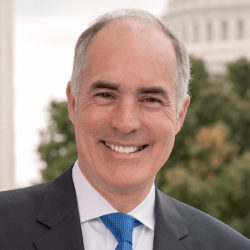

The US Senate Special Committee on Aging is launching a review of the assisted living industry following recent articles in the Washington Post, which reported on the deaths of residents who wandered from communities, as well as the New York Times and KFF Health News, which scrutinized an industry pricing structure that adds fees on top of basic charges to cover additional services, as well as rate increases and the for-profit status of most providers.
Committee Chairman Sen. Bob Casey (D-PA), who has scheduled a hearing for Jan. 25, sent letters dated Monday to the leaders of Brookdale Senior Living, Atria Senior Living and Sunrise Senior Living, asking them to address his “significant concerns” about costs, staffing levels and resident safety.
“Despite these high costs, residents in assisted living facilities have been put in harm’s way, leading to avoidable injuries and death,” Casey wrote in his letter to the large providers, detailing points made in the November Times / KFF Health News articles and December Post articles.
Assisted living communities primarily are regulated at the state level, but the committee frequently has used its authority to “examine private companies when concerns arise about potential health and safety, as well as financial risks posted to older adults,” the senator said.
“The Senate Special Committee on Aging has jurisdiction over the problems older adults face, including matters of maintaining older adults’ health, their ability to secure proper housing, and their ability to obtain care or assistance when needed,” Casey wrote. “As chairman, I have an interest in ensuring that older adults and people with disabilities are receiving high quality care, have access to proper housing and receive good value for their hard-earned dollars.”
Specifically, Casey asked the companies to provide information and documents no later than Feb. 5 detailing how they communicate the cost of services to residents and their families, rates they charge in each state, and their schedules of services and costs. Additionally, he asked them to provide information on average revenue per occupied unit for the past seven years, figures on the number of residents who have eloped or sustained injuries due to being left unattended, information about the accessibility of information about complaints and citations received by their communities, their policies and procedures for informing residents and families about accidents, applicable staffing requirements, and job titles and associated pay rates at their companies.
“We look forward to reviewing and responding to Sen. Casey’s letter on the assisted living industry with candor and transparency,” Sunrise Senior Manager of External Communications Heather Hunter told McKnight’s Senior Living.
Atria Senior Living provided a similar response.
“Our top priority is our residents’ well-being and safety,” an Atria spokesperson told McKnight’s Senior Living. “We look forward to providing information in response to Sen. Casey’s letter.”
Brookdale said it is aware of the letter from Casey.
“Brookdale values the relationships we have created with our hundreds of thousands of residents at communities across the country over the last decade, and we are committed to providing high-quality care,” a spokesperson said. “We take seriously our mission of enriching the lives of those we serve with compassion, respect, excellence and integrity.”
Atria, Brookdale and Sunrise are some of the largest senior living operators in the country. On the 2023 ASHA 50 list issued by the American Seniors Housing Association, Brookdale topped the list of operators, and Atria came in at No. 2. Sunrise was No. 3. On Argentum’s 2023 list of largest providers, Brookdale was No. 1, Atria was No. 2 and Sunrise was No. 5.
This isn’t the first time that senators have called for an investigation related to assisted living. In one of the most recent actions, a bipartisan group of US senators, all members of the Aging Committee, in 2015 asked the Government Accountability Office to report on Medicaid oversight and quality of care in assisted living communities. Their request resulted in a 2018 GAO report.
That report contained a to-do list for the Centers for Medicare & Medicaid Services related to state reporting of deficiencies in care and services provided to Medicaid beneficiaries in assisted living communities. Some federal lawmakers and consumer advocates, however, said that they would push for changes in assisted living because of the report’s findings.
‘Isolated incidents’
Senior living industry groups have called the number of deaths reported in The Post’s story a small fraction of the total number of assisted living and memory care residents, most of whom report high satisfaction with their communities.
“The Washington Post’s reporting featured isolated incidents that assisted living communities take very seriously,” Argentum President and CEO James Balda told McKnight’s Senior Living, adding that the elopement-related fatalities highlighted in the Washington Post stories are “exceedingly rare,” occurring with 0.0015% of more than 6.2 million residents served during the timeframe of the reports.
“Our communities look forward to demonstrating to the committee that as the nation grapples to care for our aging population, assisted living provides independence and dignity for seniors,” he said.
Argentum, Balda added, “strongly supports” state regulations already in place to investigate incidents and punish any wrongdoing, and he said that any fatality is “devastating for our staff, our residents and their families.”
Calling elopements rare while acknowledging that any resident injury is “truly tragic,” National Center for Assisted Living Executive Director LaShuan Bethea said she welcomes the opportunity to engage with the committee to “further their understanding of the assisted living profession, its oversight and our deep commitment to providing quality care.”
“The assisted living profession is committed to continuing to learn all that we can about dementia and the disease process to meet the ever-changing needs of our residents,” Bethea told McKnight’s Senior Living. “Policymakers, providers and other stakeholders should come together to find ways to advance memory care while honoring why seniors and their families love assisted living — by supporting their independence and autonomy in a home-like environment.”
Assisted living will continue to evolve with the nation’s changing needs, and regulations, staffing and training requirements must evolve with them, LeadingAge President and CEO Katie Smith Sloan told McKnight’s Senior Living.
“Our elected officials and other stakeholders must prioritize policies to support older adults and the professionals working in aging services to ensure equitable access to high-quality care in assisted living, as well as other care settings,” she said.
In a response to the original package of Washington Post stories, American Seniors Housing Association President and CEO David Schless said the stories “inaccurately” suggest that elopements in assisted living or memory care settings would not occur if there were federal oversight of the setting. He also said that the articles failed to recognize the contributions of the vast majority of frontline caregivers and other senior living professionals.
Schless called assisted living “highly regulated” by states that impose strict requirements, including licensure, and cover a broad range of provisions such as those Casey asked about in his letter to providers. Schless added that states are actively involved in updating and modifying regulations and statutes on an ongoing basis.
“The states are far more responsive than the federal government in addressing the needs of residents and their families to ensure innovative services and programs are available to meet their needs and those of a rapidly aging population, including those with Alzheimer’s and related dementias,” Schless said.
ASHA, he said, also plans to respond to the committee with a rebuttal of the Post’s “misrepresentation” of the industry, providing information he said was overlooked in the reporting as well as information about the benefits and value of senior living.
Association leaders previously submitted letters to the editor to the New York Times and the Washington Post in response to their articles. Although The Post has not published the letters from the associations, it did post a letter from Andrew Carle, lead instructor in senior living administration at Georgetown University. He said that the more than 6 million Americans affected by dementia and prone to wandering would be “exponentially safer” in assisted living communities than at homes in the greater community.
Industry quality initiatives
The industry has launched several initiatives focused on building consensus around assisted living quality measures, as well as infection prevention and control efforts. NCAL last week released its 2023 regulatory review report, which highlighted regulatory requirements across all 50 states.
The Center for Excellence in Assisted Living, known as CEAL@UNC for the past year, itself was launched in 2003 as a result of a recommendation in the landmark Assisted Living Workgroup Report, delivered to the Senate Special Committee on Aging.
In a recent podcast interview with McKnight’s Senior Living, Sheryl Zimmerman, MSW, PhD, the center’s executive director, called on all assisted living stakeholders “to be more mindful in a pragmatic, feasible way” across all of assisted living to address resident care needs.
“Most everyone involved in assisted living is aware there are opportunities for improvement,” Zimmerman told McKnight’s Senior Living. “The Senate Aging Committee delved into assisted living 20 years ago with the Assisted Living Workgroup Report, which led to the national Center for Excellence in Assisted Living, and as the executive director, I welcome the opportunity this brings to coordinate efforts to work towards excellence while providing person-centered care and quality jobs.”
LeadingAge, Argentum, NCAL and ASHA in June announced that they had joined with the National Association for Regulatory Administration to develop guidance for the industry and resources for operators, regulators, policymakers and other stakeholders. The groups, working together as the Quality in Assisted Living Collaborative, first turned their attention to the area of infection prevention and control, an issue brought to the forefront during the COVID-19 pandemic, with plans to address other issues.
NCAL also has its own National Quality Award program, based on the Baldrige Performance Excellence Framework. It recognizes assisted living providers that meet certain goals. The organization’s voluntary quality initiative for assisted living communities also has goals related to staff stability, customer satisfaction, hospital readmissions and the off-label use of antipsychotic medications.


